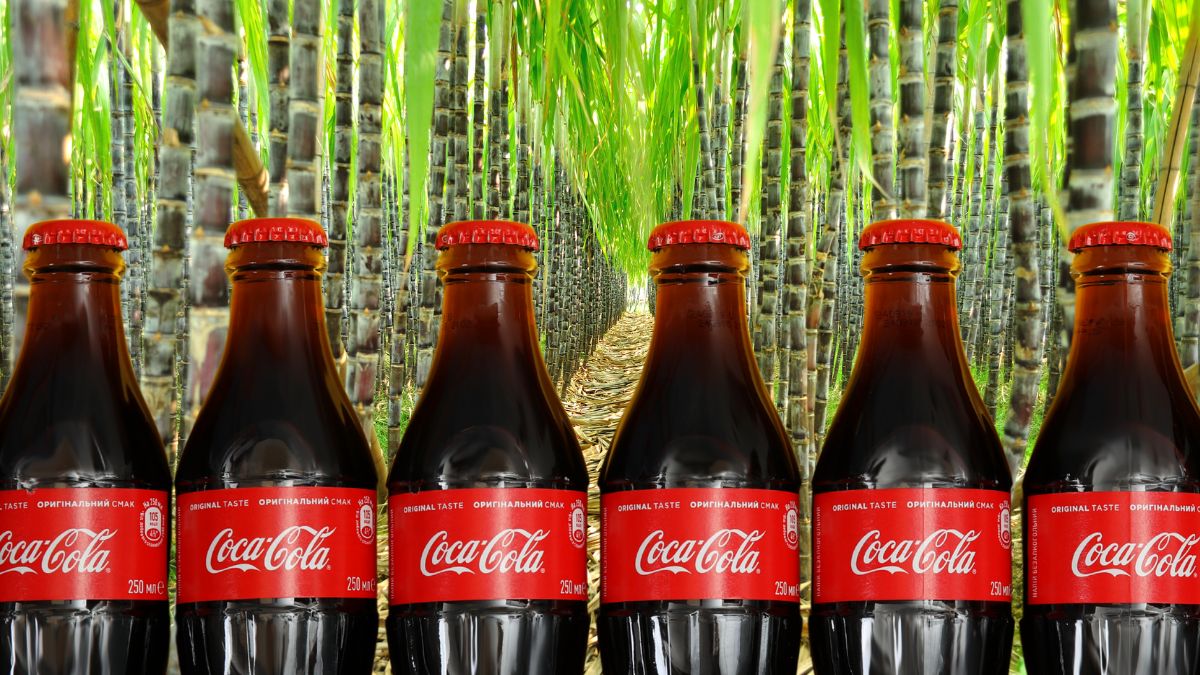
The Coca-Cola formula in the United States is about to undergo a historic change. For the first time in decades, the soft drink giant has officially announced that it will offer a version of its cola sweetened with cane sugar instead of the traditional high-fructose corn syrup (HFCS). This move comes in response to a request from President Donald Trump, who celebrated the news on his social network Truth Social as a personal request fulfilled.
READ ALSO. When will Starbucks launch its new Fall menu? Here’s a sneak peek
Why Is Coca-Cola Switching to Cane Sugar in the U.S. Formula?
Coca-Cola has confirmed that starting this fall, it will launch a line of its flagship soda made with U.S.-grown cane sugar. Although the company stated in its press release that this is part of an effort to “expand its product range” within its innovation strategy, the announcement is clearly tied to the political climate.
Just days ago, Donald Trump posted on Truth Social that he personally spoke with the company urging them to abandon corn syrup in favor of real cane sugar.
Coca-Cola confirmed the change this week, fulfilling a long-held desire of nostalgic American consumers who favor the flavor of Mexico-made Coca-Cola, renowned for being sweetened with cane sugar.
YOU MAY BE INTERESTED: Black and Gold Coca-Cola Glass, The Most Desired by Collectors
What Are the Implications of This Change for the U.S. Corn Industry?
Coca-Cola’s return to cane sugar in its local market is no small economic decision. For decades, high-fructose corn syrup (HFCS) has dominated as a sweetener in the U.S. food industry, thanks to federal corn subsidies and high tariffs on imported sugar.
The Corn Refiners Association reacted swiftly. Its president, John Bode, warned that this move “could cost thousands of jobs in food manufacturing,” reduce farmers’ income, and increase reliance on imported sugar, all without significant nutritional benefit. The BBC reported this.
While recent clinical studies haven’t shown substantial differences between HFCS and sucrose regarding heart health or body weight, some markers of inflammation increase among those consuming corn syrup, fueling skepticism about its long-term safety.
READ ALSO. When will Starbucks launch its new Fall menu? Here’s a sneak peek
Why Did Trump Pressure Coca-Cola to Use Cane Sugar?
Donald Trump’s pressure is part of his administration’s strategy to combat chronic diseases through the “Make America Healthy Again” (MAHA) initiative, led by Health Secretary Robert F. Kennedy Jr. This commission recently concluded that HFCS might be linked to childhood obesity and other chronic conditions.
For Trump, cane sugar symbolizes a return to “purity” in American food, aligned with his nationalist and protectionist rhetoric. It’s no coincidence that during the same period, his administration increased tariffs on aluminum and other key products in food and beverage supply chains.
Additionally, Coca-Cola has historically been close to the Republican administration: CEO James Quincey gifted the president a special edition Diet Coke to commemorate his second term, and the company contributed nearly $290,000 to the inauguration festivities.
What Impact Will This Formula Change Have on Consumers?
For consumers, the return of cane sugar to U.S. Coca-Cola brings a mix of nostalgia and anticipation. Since 2005, Coca-Cola has imported glass bottles from Mexico—where the cane sugar formula is standard—sold at premium prices in specialty stores.
Experts note that while the taste differences between HFCS and sucrose can be subtle, aficionados find them significant. The perception of a “more natural” product could give Coca-Cola a competitive edge in a market increasingly seeking products free of artificial or highly processed ingredients.
However, analysts warn that the change will increase production costs and require supply chain adjustments, which could eventually be reflected in consumer prices. Nevertheless, the company assured that the impact would be manageable.
How Did Coca-Cola Perform in Its Quarterly Results After the Announcement?
The cane sugar announcement coincided with Coca-Cola’s Q2 2025 earnings report, where the company exceeded market expectations. The company reported revenues of $12.62 billion, a 2.5% increase from the previous year and above LSEG’s estimate of $12.54 billion.
Net income grew by 58%, reaching $3.81 billion, while earnings per share hit 87 cents, surpassing the consensus of 83 cents. The company highlighted the strong performance of Coca-Cola Zero Sugar, which saw a 14% increase in volumes driven by global preference for zero-calorie drinks.
However, overall sales volume fell by 1%, with declines in key markets like Mexico, India, and the United States, attributed to economic factors and a boycott led by Hispanic consumers following a labor scandal triggered by a fake video circulating on social media.

